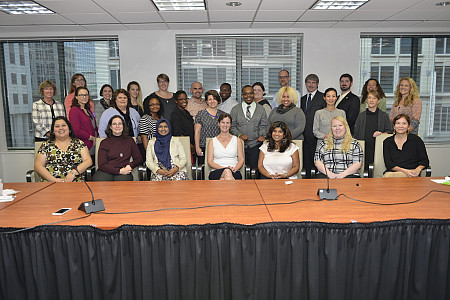Vision 21
Increasing the Field’s Capacity to Serve Victims

Click here to see photos of the event.
Wraparound Legal Assistance Networks
Victims have a myriad of legal needs in the aftermath of their victimization which often require navigation of a complex array of systems. Unfortunately, no and low cost, expert legal services for victims are in short supply. Building upon the knowledge gained from the field with the Vision 21 project, the federal Office for Victims of Crime (OVC) is working to ensure “that crime victims’ rights are enforced and that victims of crime receive the broad range of legal services needed.” To achieve this OVC funded 10 legal networks across the country and selected NCVLI to be the training and technical assistance provider.
In this role we have four goals:
- Enhance network effectiveness through knowledge sharing systems.
- Facilitate intra- and inter-network collaboration.
- Ensure effective legal advocacy through intensive, proactive and responsive legal technical assistance and training.
- Document promising practices to enhance provision of effective legal services today and into the future.
Working together with our partners, the ABA Commission on Domestic & Sexual Violence, the Coalition to Abolish Slavery and Trafficking, the Maryland Crime Victims Resource Center Inc., the National Child Advocacy Center,the Stalking Resource Center, and the Tribal Law and Policy Institute, our vision is that someday every victim will have access to a knowledgeable lawyer to protect his or her rights!
The Victim Legal Assistance Networks are located in the following jurisdictions: Alaska; Los Angeles, California; Denver, Colorado; Cook County, Illinois; Georgia; Minnesota; Montana; New York; Texas; and Washington DC.
This project was supported in part by Grant No. 2014-XV-BX-K013, awarded by the Office for Victims of Crime, Office of Justice Programs, U.S. Department of Justice. The opinions, findings, conclusions or recommendations expressed in this document are those of the author(s) and do not necessarily represent the official position or policies of the U.S. Department of Justice.
__________________________________________________________________________________________

Background on Vision 21
In the summer of 2010, NCVLI was awarded a grant from the Department of Justice’s Office for Victims of Crime (OVC) to undertake one of four projects under the “Vision 21: Transforming Victim Services” initiative. “Vision 21” was designed to develop a philosophical and strategic framework for defining the role of the field in the country’s response to crime and moving the field forward in the future. The four project areas were: (1) The role of the crime victims’ field in the overall response to crime and delinquency in the U.S., (2) Building capacity in the crime victims’ field to better serve victims of crime, (3) Enduring challenges in the crime victims’ field that are still being addressed, and (4) Emerging challenges that the crime victims’ field has yet to address.
The grant NCVLI received was for area (1) - an in-depth look at the role of the crime victims’ field in the overall response to crime and delinquency in the United States. For this project, NCVLI brought together many diverse perspectives in a Stakeholder Group to critically examine and create consensus on foundational questions and proposed answers related to who is a crime victim and the field’s response to underserved and unserved victims through enhanced partnerships and better integration of the field into the broader criminal justice field to advance crime victims’ rights. The Stakeholder group brought together national experts on issues including, but not limited to, child welfare, health, mental health, victims’ rights enforcement, judiciary, law enforcement, legal, ID theft, sex trafficking, gangs, violence against women, at-risk juveniles, and corrections. This Stakeholder Group was further augmented by an Expanded Partner Group consisting of a wide range of professionals in the field. In addition, NCVLI allowed for input from the field at large through an online process.
When we began this work, we knew the project was ambitious, but were excited to be a part of the visioning of the future of the victims’ field. Thanks to the dedication and wisdom of each of you, we were not disappointed. We were able to engage in challenging and sometimes uncomfortable conversations, to learn from each other, and to contribute to the larger Vision 21 effort. The final Vision 21 report can be downloaded here.
This project was funded by Grant No. 2010-VF-GX-K011 awarded by the Office for Victims of Crime, Office of Justice Programs, U.S. Department of Justice. The opinions, findings, and conclusions or recommendations expressed in this document are those of the contributors and do not necessarily represent the official position or policies of the U.S. Department of Justice.